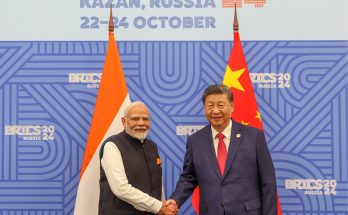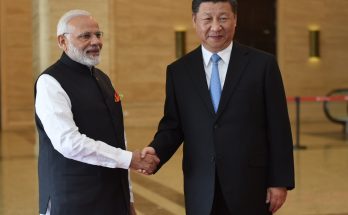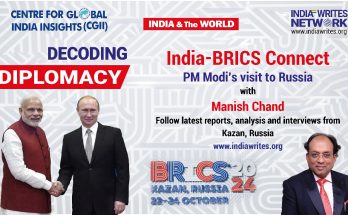 The verdict on The Philippines’ petition regarding the legality of Chinese claims in the South China Sea was much awaited, given that China had claimed the sea almost in its entirety. The Chinese reaction in the run-up to the award indicated that they were prepared for a verdict that was not likely to be in their favour. Chinese media had cast aspersions on the claims, the process and the very basis of arbitration itself and had categorically rejected them. The rest of the world was, however, awaiting the verdict with bated breath.
The verdict on The Philippines’ petition regarding the legality of Chinese claims in the South China Sea was much awaited, given that China had claimed the sea almost in its entirety. The Chinese reaction in the run-up to the award indicated that they were prepared for a verdict that was not likely to be in their favour. Chinese media had cast aspersions on the claims, the process and the very basis of arbitration itself and had categorically rejected them. The rest of the world was, however, awaiting the verdict with bated breath.
The verdict was largely along expected lines, perhaps more favourable to The Philippines and more detrimental to Chinese interests than predicted. The entire basis of Chinese claims on the South China Sea, the historical claims and the nine dash line, was ruled to be invalid under international law and UNCLOS.
The Chinese reaction to the award was strongly negative as was to be expected. China declared the award as “null and void” and “with no binding force.” The Chinese press called it a “farce”, a “US led conspiracy” and a threat to Chinese sovereignty. Incidentally, the Chinese claim, “sovereignty” over the South China Sea, is an inadequately defined concept in the marine sphere not totally in accordance with established norms of global maritime governance. The reaction of the other players was also along expected lines, with the US and Japan welcoming the award and asking the parties involved to eschew the use of force.
The Indian reaction was very measured and nuanced. Firstly, the fact that India came out with a reaction on the day of the judgement is itself note-worthy as it need not have done so, not being directly involved in the dispute. The wordings of the statement also have been carefully crafted. It says that “India has noted the award” of the tribunal and then goes on to state India’s oft repeated position of supporting freedom of navigation and over-flight in the region. It calls upon the states involved to resolve disputes peacefully and not escalate tensions. It then states that “Sea lanes of communication passing through the South China Sea are critical for peace, stability, prosperity and development. As a State Party to the UNCLOS, India urges all parties to show utmost respect for the UNCLOS, which establishes the international legal order of the seas and oceans.”
This is in total concordance with India’s stated position on the issue. In fact, India’s total and graceful acceptance of a similar arbitration proceedings between it and Bangladesh, which according to some observers did not go fully in its favour, was in fact a manifestation and demonstration of that position. Thus India is not merely sermonising in this case, as it is sometimes seen to do, but making a statement consistent with its continuing position on the issue.
A closer reading of the statement reveals that India, while cleverly using unexceptionable language that is widely used and respected globally, has actually not supported the Chinese position in the SCS and called upon it to adhere to the limits laid down in the UNCLOS as opposed to its claims of sovereignty of the entire SCS and the nine dash line. It could even indirectly be seen as asking China to in fact adhere to the arbitration award, as the award reiterates the tenets of UNCLOS. India’s own interests of having freedom of navigation and over-flight in the region also rightly find mention in the statement. The timing of the statement, on the day of the award, is also significant as it indicates to the Chinese and the world at large that India is ready to take positions on issues that affect it. In a much smaller way, it could even be seen as doing to the Chinese what China did to it in the case of the NSG with procedures, morality and legalese being beseeched while taking up positions contrary to the other’s perceived national interests.
While the Indian press and analysts could have a field day analysing the award from various points of view and giving their various recommendations, there is probably no need for any more official reactions from the Indian Government, the point having been made. India after all does have vital interests in maintaining a peaceful and stable relationship with China given the extent of trade links, disparity in economic standing, existing border dispute, etc. India has more to lose than gain by ratcheting up tensions especially at a time when the Chinese could be probably feeling hemmed in and isolated on the global stage by world-wide reactions to the award. The point that probably needed to be made has been made by the timely statement of the MEA.
This is not to say that India should not continue efforts to vigorously safe-guard its interests in that vital region. India is a growing economy with vital trade routes passing through the region. Thus freedom of navigation and over flight are of vital interest to India. There is a justified expectation of countries in the region that India as a benign emerging power without any direct regional stakes apart from trade interests should play its role in enhancing safety and security of the Global Commons. Close relations with the US, without being sucked into the trap of joint patrols or other such ideas, as well as with Japan and Australia are imperative. Malabar could continue to be conducted every year with increased scope and participation of the Australians too on a case by case basis in addition to the Japanese.
Links with the ASEAN countries both individually and collectively should also receive due attention. The supply of frigates to The Philippines, for which Garden Reach Shipyard, Kolkata, has been declared the lowest bidder in a tender involving global competitive bidding should be pursued. Supply of BrahMos and Varunastra to Vietnam should also be pursued. Closer military-to-military relations need to be fostered with Indonesia, Malaysia and Thailand. India has close economic and trade links with all these countries and enhancing military trade with them needs to be seen both in this context as well in the light of the focus on “Make in India” making Indian arms competitive globally.
The Permanent Court of Arbitration’s judgement and China’s subsequent actions could result in lesser support for and greater suspicion of China’s motives as it “breaks out” and reaches towards great power status. India needs to be alive to this and make use of this perception to advance its legitimate peaceful interests in the region
Courtesy: IDSA
Author Profile
- India Writes Network (www.indiawrites.org) is an emerging think tank and a media-publishing company focused on international affairs & the India Story. Centre for Global India Insights is the research arm of India Writes Network. To subscribe to India and the World, write to editor@indiawrites.org. A venture of TGII Media Private Limited, a leading media, publishing and consultancy company, IWN has carved a niche for balanced and exhaustive reporting and analysis of international affairs. Eminent personalities, politicians, diplomats, authors, strategy gurus and news-makers have contributed to India Writes Network, as also “India and the World,” a magazine focused on global affairs.
Latest entries
 Business with IndiaOctober 25, 2024Modi’s new mantra for blending India’s Dynamism with Germany’s Precision
Business with IndiaOctober 25, 2024Modi’s new mantra for blending India’s Dynamism with Germany’s Precision China ConnectOctober 23, 2024“Our Diversity and Belief in a Multipolar World Are Our Strengths”: PM Modi at BRICS Summit
China ConnectOctober 23, 2024“Our Diversity and Belief in a Multipolar World Are Our Strengths”: PM Modi at BRICS Summit DiplomacyOctober 23, 2024“BRICS: A Beacon of Hope for Global Unity and Reforms “
DiplomacyOctober 23, 2024“BRICS: A Beacon of Hope for Global Unity and Reforms “ DiplomacyOctober 23, 2024Deepening Ties Amidst Global Turmoil: PM Modi Meets Iranian President at BRICS Summit
DiplomacyOctober 23, 2024Deepening Ties Amidst Global Turmoil: PM Modi Meets Iranian President at BRICS Summit






